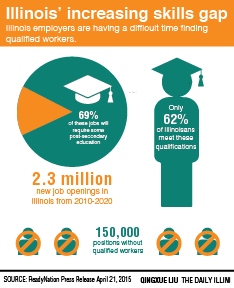Illinois may experience a gap in qualified workers, according to report

Apr 30, 2015
Last updated on May 10, 2016 at 06:44 p.m.
If current trends continue, Illinois will experience a skills gap, as not enough employers can find people who meet job qualifications, according to a report by ReadyNation, a business leader organization under the Council for a Strong America.
According to the report, 69 percent of the 2.3 million estimated job openings in Illinois available between 2010 and 2020 will require employees to have post-secondary education; however, only 62 percent of Illinois citizens are educated past high school. This gap means 150,000 jobs in Illinois will be filled by unqualified candidates, according to the report.
Sean Noble, Illinois state director at ReadyNation, said the skills gap hurts businesses because then they need to train people, which costs money and causes disruption in the workplace.
In Illinois, there is a 7 percent difference between the number of job openings that require postsecondary education and the number of qualified workers. This gives Illinois the largest skills gap in the Midwest, tied with Indiana and Kentucky. The national average is 5 percent.
Get The Daily Illini in your inbox!
According to the report, many businesses reported an increased need in employees with soft skills such as communication, collaboration and critical thinking, Noble said.
ReadyNation deals with legislative agendas from birth to 12th grade, Noble said, but proper college resources are necessary to create a proficient workforce.
The University’s Career Center helps employers find qualified workers through organized career fairs, said Jennifer Neef, associate director of the Career Center.
According to the Recruitment Benchmarks report, produced by the Career Center, 17,902 students used I-Link, the online job board run by the Career Center, during the 2013-2014 academic year. Additionally, 29,657 students participated in career fairs, and 4,007 employers had recruiting engagements at the University during that time.
“We help students think through what are their interests, what are their skills and what are the opportunities and options out there where they can align their professional aspirations with their skills and opportunities,” Neef said.
The Career Center also helps students write resumes and prepare for interviews, she said.
ReadyNation proposed fixing the problem by increasing funding for early childhood education and vocational training. Noble said the organization proposed a $50 million increase for early childhood education in programs like preschool, parent coaching and day care. He said these programs are meant to help develop soft skills and start children off on the right foot.
Stephanie Smith, assistant professor in early childhood education, said early education programs help students who may not get the education that other children gain at home.
“There is research that having a high-quality early childhood program can help children who might be entering schools a little behind to catch up,” Smith said.
For example, poorer households may not be able to spend as much time with their children because of work, and day cares can help to eliminate this gap.
These programs, he said, help children develop soft skills.
“We teach children how to be creative, to investigate and to learn how to learn,” Smith said.





